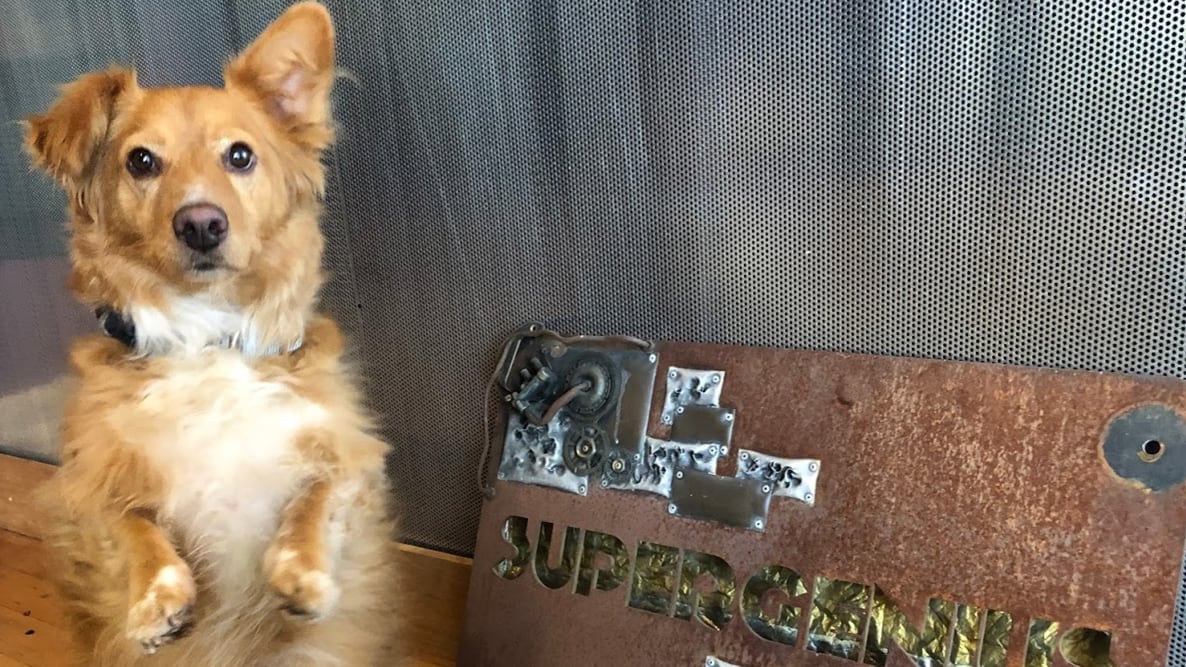The century-old, tan-colored building near the corner of 7th and Main streets in Oregon City holds a lot of secrets.
Inside the headquarters of video game development studio SuperGenius, though, it hardly seems there's highly classified operations going down. Cubicle desks are littered with action figures. There's a fish tank in the kitchen and a bean-bag chair in the lounge, and the white noise of computer processors hums throughout.
At one dual-monitor computer, lead artist Aubrey Williams sits with her dog, a corgi-retriever mix named Gryffindor, working on a new mobile game called Dog Save the Queen. The premise is right there in the title: The queen of England has been kidnapped by aliens and her fate falls to the paws of her loyal corgi.

It's one of the few projects the staff can talk about freely. Other than the odd indie game, the company's small team of 30 illustrators, designers and programmers spend their time developing concept art, 3D environments, and animation for titles typically advertised on billboards: major intellectual properties from Marvel and Disney, Game of Thrones and the enormously popular first-person shooter Overwatch, which has over 40 million players worldwide.
The company can best be described as a "game developer's game developer," according to chief operating officer Peter Lund, meaning a lot of the work it does is for other, often much larger, companies. But when it comes to the specifics of that work, lips are sealed.
"We're kind of like SEAL Team Six," says SuperGenius CEO Paul Culp. "They call us up, and a lot of times we take on projects where we're not allowed to say we worked on them."
How did this boutique-sized company, housed in a nondescript building in a quaintly nondescript town, end up becoming one of the gaming industry's go-to outside animators?
For Culp, it was all by design. He's been working with big-name publishers, like Activision, EA, and Rockstar, for the past 25 years, since getting his start in San Francisco. When he landed at Funnelbox, a Portland video production company, in 2008, he met a team of four animators working on game cinematics for the Eugene software company Pipeworks Studios. Culp asked former Funnelbox CEO Robb Crocker if he could tap into his network to bring in more animation work, creating what would eventually become SuperGenius.
Culp then bought SuperGenius outright in 2012 and moved it down to Oregon City, taking his industry contacts with him.

Instead of heading south to the cost-of-living nightmare of Silicon Valley, Culp made a conscious choice to stick along the Willamette. At the time, Oregon City seemed even smaller than it does today. "When I first came here, I got out of my car and it smelled like farts," Culp says, most likely referencing the scent given off by the now-closed Blue Heron paper mill. "There was, like, newspapers flying through the street. All the shops were closed." But the anonymity was precisely what he was looking for.
"We're a very big secret," he says. "I like being the crack force that gets called in to help other people. So we don't advertise that much. We don't like people to know we're here. The stuff that we work on attracts a pretty big fan base."
Oregon City still isn't a tech metropolis, but over the years, bars, breweries and brunch spots have revitalized Main Street. SuperGenius, meanwhile, has grown as well, doubling its crew of highly skilled developers to take on time-intensive work for a more and more high-profile clientele.
With Culp's Rolodex and his team's high-quality reputation, it didn't take long for SuperGenius to build its repertoire. Its work on Activision's Skylanders game led them to Blizzard, a subsidiary of Activision, and eventually to Overwatch. Since launching in 2016, the franchise has brought in over $1 billion. At SuperGenius, a whole team of animators are assigned to the game, tasked with making the behavior of each colorful, choreographed character effortless and believable.
"We're trusted because we can estimate how much time it's going to take to do something [and] how much it's going to cost," says Lund. "But then if you're good at that, you've got to bring the quality, and I think we had the quality first before we built the rest."
SuperGenius has done well for its size, attracting household names for such a small shop, on such a small block, in a town with barely 37,000 people. Naturally, expansion is on Culp's mind. He wants to double his staff yet again, this time to 60, and open outsourcing shops south of the border, in Colombia and Argentina, where he sees "pockets of talent."
"We're only going to get so big here because we're expensive and we can't really compete with the bigger folks," said Culp. "If we want to expand, we're going to have to start looking elsewhere."
"Elsewhere" also includes other industries. Right now, SuperGenius is taking its world-creating game expertise and applying it to the virtual reality and health care sphere, with help from a research team at Johns Hopkins.
"We've been interested in the way VR talks to the brain since we got our first Oculus headset," says Lund. "Initially, it was both dealing with vertigo and nausea, and then we started to see how easy it was to elicit really raw emotion."
Lund says SuperGenius plans to spin off a new company, which is currently fundraising, to build "upper-extremity physical therapy tools in VR" that assist with symptom tracking and mitigating pain.
"The more we dug into the research, the more we realized immersive media is speaking to the brain in a unique way," says Lund. "It's much more powerful and more suggestive than any other media we humans have created."
The gaming industry has been waiting for VR to take off, but the clunky, expensive headsets needed for a limited library of entertainment creates a barrier for many users. In the medical space, however, Culp sees huge opportunities for growth.
"We're realizing that the other uses for VR, like psychology and health care, are huge," says Culp. "Hacking the mind, basically."
What does that mean, exactly? As with most things at SuperGenius, mum's the word. "I can't talk about it too much," he says.
SuperGenius Is a Small Company With Big Clients. Just Don't Ask About Them.
A Tour of Post-Apocalyptic Oregon in "Days Gone," the State's Biggest Video Game Release Yet

